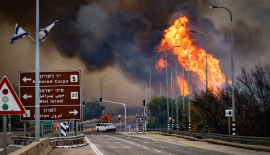Weekly Update: Consequences for Israel of the US withdrawal from Afghanistan
This week we continue to share a wide selection of articles exploring the consequences of the US withdrawal from the Middle East, and specifically the recent regime change in Afghanistan.
Michael Mandelbaum argues that we now live in the “post-post-Cold War world,” in which the U.S. faces three “major challengers”: China, Russia, and Iran. The Biden administration “has no experience dealing with what is the central issue in foreign policy when there are challengers, namely whether, when, and how to use and threaten force.”
The vacuum left by America is being quickly filled by others with interest in the region, such as Iran, China and Turkey.
All of this will have major repercussions for Israel. This week, Israeli PM Naftali Bennett is in Washington for talks with President Biden. High on the agenda will be the question whether the US still intends to re-enter the JCPOA agreement with Iran.
The Editorial team
Israel & Christians Today
Biden looking for positive Bennett meet amid Afghan crisis, but not at any cost
Jacob Madid writes in Times of Israel: “White House going out of its way to ensure sit-down goes well, but will want answers regarding Palestinians and hasn’t given up on nuke deal, despite assumptions in Jerusalem.”
> Read more..
The U.S. withdrawal from Afghanistan: What’s next?
IDF Maj. Gen. (res.) Yaakov Amidror (former chairman of Israel’s National Security Council) writes: “Israel must continue to strengthen its ability to defend itself by itself, albeit with the assistance of the United States. Israel will remain the most reliable U.S. ally in the face of threats and changes washing over the region.”
> Read more..
Biden’s Middle East Policy Challenges
According to Michael Mandelbaum, the Biden administration is handicapped by the fact that its foreign policy team is dominated by Obama administration personnel who formulated their worldviews during the “post-Cold War” era in which the U.S. “faced no serious threats.” We now live in what Mandelbaum calls the “post-post-Cold War world,” in which the U.S. faces three “major challengers”: China, Russia, and Iran. The Biden administration “has no experience dealing with what is the central issue in foreign policy when there are challengers, namely whether, when, and how to use and threaten force.”
> Read more..
Turkey Sees Afghanistan as Lever for Global Agenda
Seth J. Frantzman in Jerusalem Post: “Turkey is desperate to find a way to work with the Taliban and get control of Kabul’s Hamid Karzai International Airport. It has several agendas. It wants to control Afghanistan as a key route to China and Iran and also to sit astride global jihadist moments from Idlib to Kabul so that it can use them for its own agenda to become an Islamic world leader.”
> Read more..
This Betrayal of Afghanistan Is Beyond Belief
Tarek Fatah Writes At Middle East Forum: “Just one day after Kabul fell, Taliban 2.0 along with their American and Pakistani sponsors reassured us that the fresh version of the Islamist terrorist group was ‘new and improved.’ Then we witnessed the work of the barbarians.”
> Read more..
Arabs: Biden Brings Extremism, Terrorism Back to Life
Abu Khaled Toameh writes at Gatestone Institute: “Thanks to the Biden administration, say the Arabs and Muslims, terrorist groups that want to wage jihad (holy war) against the US and Israel and threaten the security and stability of many Arab countries have firmly increased their foothold in the Middle East.
> Read more..
Israeli perspective on the US withdrawal from Afghanistan
Eldad Shavit and Simon Stein at INSS write: “In the short term, America’s image and credibility have been damaged, and various international actors will seek to use this to promote their own interests. However, it is not yet clear whether the withdrawal will translate into a long term strategic challenge. For Israel, it is important to examine the effect on extremist Islamic organizations and on Iranian motivation to push the United States out of Iraq. In addition, how the United States sees Israel’s role in the Middle East in view of the changes in its regional deployment is of major significance.”
> Read more..
Afghanistan’s Christians are turning off phones and going into hiding
Kelsey Zorzi wrirtes in The Hill: “Some Christians on the ground have expressed that, with the takeover of Kabul, they expect to be killed, mafia-style. Although some reports say that the Taliban is already conducting targeted killings of Christians and other minorities found using public transportation, as well as executing anyone found with Bible software installed on their cell phones.”
> Read more..
Understanding Afghanistan, Jihad and Islam
A conversation with globally recognised Islamics scholar, academic, and Anglican pastor, Rev Dr Mark Durie. If you want to understand more about what is happening in Afghanistan, how events there fit into the broader Muslim world, and what some implications for the rest of the world might be, listen and learn.
> Read more..
Jacob’s Sons | Episode 8 in video series on Romans 9-11 with Johannes Gerloff
Paul calls those, in whose place he wants to be cursed and cut off from Messiah, “Israelites”. Shouldn’t he have called them “the Jews” or “the Jewish people” as it would have been self-explanatory in his time? Or, should he not have called them “Sons of Jacob”, “House of Jacob” or “Jacob”, if he would have preferred a biblical terminology?
Scripture for the week: Jeremiah 31:3-6
The Lord appeared to us in the past, saying:
“I have loved you with an everlasting love;
I have drawn you with unfailing kindness.
4 I will build you up again,
and you, Virgin Israel, will be rebuilt.
Again you will take up your timbrels
and go out to dance with the joyful.
5 Again you will plant vineyards
on the hills of Samaria;
the farmers will plant them
and enjoy their fruit.
6 There will be a day when watchmen cry out
on the hills of Ephraim,
‘Come, let us go up to Zion,
to the Lord our God.’”




